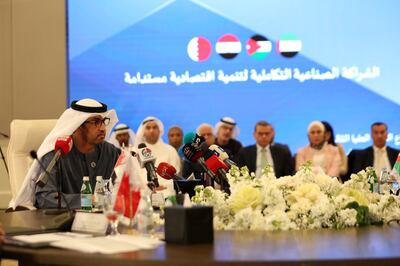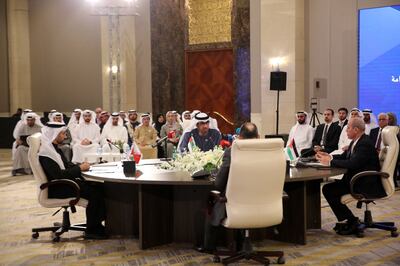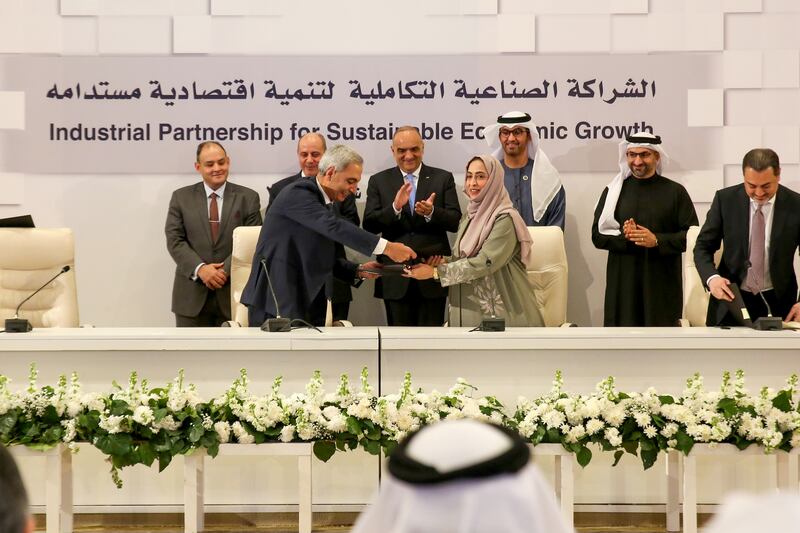Companies from the UAE, Egypt, Jordan and Bahrain on Sunday signed 12 manufacturing and mining agreements worth $2 billion, the first tangible result of an ambitious plan to integrate the industrial sector in the region.
Jordanian prime minister Bisher Al Khasawneh attended the signing in Amman, underlining the importance the kingdom places on creating jobs to curb unemployment.
The deals will create nearly 13,000 job opportunities in the four countries in the fields of car production, minerals and pharmaceuticals.
“We regard integration as the top of economic priority, especially after the challenges and crisis that the world went through in recent years,” said Dr Sultan Al Jaber, the UAE’s Minister of Industry and Advanced Technology and Special Envoy for Climate Change.
“The most important thing now is to focus on execution and creating practical, actual results.”

Last year, the UAE, Egypt and Jordan formed the Industrial Partnership for Sustainable Economic Development to boost growth while exploring opportunities for joint investments.
Bahrain, a major producer of raw aluminium and iron ore, joined the partnership in July.
A $10 billion investment fund has been set up and is being managed by Abu Dhabi holding company ADQ to accelerate work on the partnership across five priority sectors, including petrochemicals, agriculture and metals.

The largest project announced on Sunday was a $550 million plan by UAE company M Glory Holding to build three factories in the UAE, Egypt and Jordan to produce an electrical crossover with a combined capacity of 40,000 vehicles a year.
The vehicle will start rolling out of a UAE factory this year, Omar Al Suwaidi, Undersecretary of the UAE Ministry of Industry and Advanced Technology, told The National.
“The first production will be in the Emirates this year, God willing,” he said.
He said that although the four governments are providing “strategic guidance” to expand the industrial sector across the region, they are relying on the private sector to do the job.
A proposed $800 million fertiliser factory in Jordan is among the large projects under consideration, he added.
“The government's role is to define the priorities, facilitate the projects and link them together,” Mr Al Suwaidi said.
CFC, another Emirati holding company, will invest $400 million in an animal feed and chemicals factory in Egypt, using potassium imported form Jordan. Constriction work on the factory is set to start in July.
The Soda Chemical Industries of Egypt will invest $500 million to produce 500 million tonnes a year of soda ash, a widely used raw material in industry. The Emirates Flat Glass Company, owned by Dubai Investments, will be a main buyer of the product.
Ahmed Saleh, Egypt's Minister of Industry and Trade said on Sunday that integration of the industrial sector in the region is the best way forward as global economic pressures have left Arab countries little option but to integrate.
“We must strengthen regional partnerships and include the private sector as a major partner in implementing sustainable development plans,” he said.
“Recent geopolitical and economic challenges demand … more robust economic partnerships,” the minister added.
Emirates Global Aluminium will also build a $200 million silicone factory using raw materials produced by the Jordanian Al Manaseer group, and Jordanian and Egyptian companies will produce pharmaceuticals and medical supplies on behalf of UAE and Bahraini companies.
Jordanian Industry Minister Youssef Al Shamali said that Jordanian companies will “immediately” start exports of raw materials, such as phosphate, to prepare for manufacturing the end products.
He said the four countries will meet later this year in Bahrain to discuss more project ideas and to “solve any impediments to the investments.”
“This is an integrated Arab effort directed by the highest political levels of the four countries,” he said.
Adel Fakhro, Bahrain's Minister of Industry and Commerce, said Bahrain has proposed more than 10 projects focused on making Middle East supply chains more efficient.
In 2019, the UAE, Egypt, Jordan and Bahrain accounted for 30 per cent of the Mena region’s industrial contribution to GDP, or $65 billion worth of industrial exports.
The Middle East and Central Asia are forecast to grow by 3.2 per cent following a 5.3 per cent expansion in 2022 and then pick up to 3.7 per cent in 2024, according to the International Monetary Fund.






